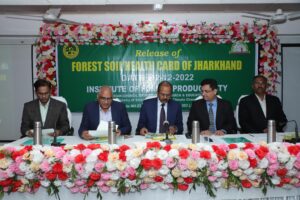CONRAD DIAS
Ranchi, Dec 1: Institute of Forest Productivity (IFP), a research institute situated in Ranchi, has worked along with the Indian Council of Forestry Research and Education (ICFRE) to issue the country’s first-ever Forest Soil Health Card (FSHC) on Friday. As per the report, the world is losing one acre of soil per second and after 60 years, there will be no soil left.
The institute was entrusted with the task of preparing FSHC for the states of Jharkhand, Bihar and West Bengal. Accordingly, it was found that the common vegetation observed in the Jharkhand state was Sal in maximum places along with the other species like Mahua, Karam, Sidha, Kend, Asan, Dhota, Chironji etc.
Moreover, the pH level in Jharkhand’s soil was moderately acidic and the electrical conductivity was observed to be <2, it seems that the effect of salinity is negligible in the state.

Similarly, organic carbon was observed to be 0.4 % in most of the forest divisions. In general, soil organic matter acts as a source of NPS and micronutrients, which are vital for the growth of plants and are made available through the mineralisation process. The average N content present in most of the forest divisions was about 140 kg/ha.
Dr Vijender Pal Panwar, National Project Coordinator, Forest Research Center, Dehradun, while giving an overview of the project, said that the main objective of creating a Forest Soil Health Card is to diagnose the constraints related to the fertility of degraded soils in the state and suggest soil nutrient management practices.
IFP believes that the benefits will reach the rural population living on the edge of forests and the FSHC will be very useful to identify soil constraints of the area. India has set a target keeping in mind the forest cover, soil quality, REDD+, green highways etc.






